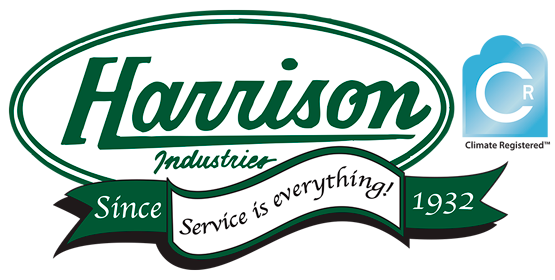
Residential Food Waste Services
Harrison Industries now offers residential food waste recycling in compliance with California Senate Bill 1383 (SB 1383). SB 1383 requires communities to reduce organic waste disposal, including food waste, by 75% of 2014 levels, by 2025. Existing yard waste carts are used to collect bagged food waste. There is no increase in price for service.
Please do not place food waste directly into the yard waste cart, as this will contaminate the yard waste. All food waste must be bagged. Please use your own plastic or paper bags, and be sure to seal them securely. Clear bags are preferred (though not required). Reusing what you have is best, but bags are available at local retailers and online sales outlets. To minimize the number of food waste bags you use, gather food waste throughout the week in a single bag or a lined pail in the kitchen or in a container outside. Securely tie the bag and place it in your yard waste cart for weekly pickup.
All food waste can be collected. This includes, but is not limited to, meat, bones, fish, shells, dairy, bread, fruits, vegetables, peels, pits, cobs, and coffee grounds.
Residents of the City of Ventura: The City of Ventura is offering a complimentary food waste collection pail to assist Ventura residents with participating in the new food waste recycling program. You can find more information by clicking here.
A Step-by-Step Guide to Using the New Program
Step 1
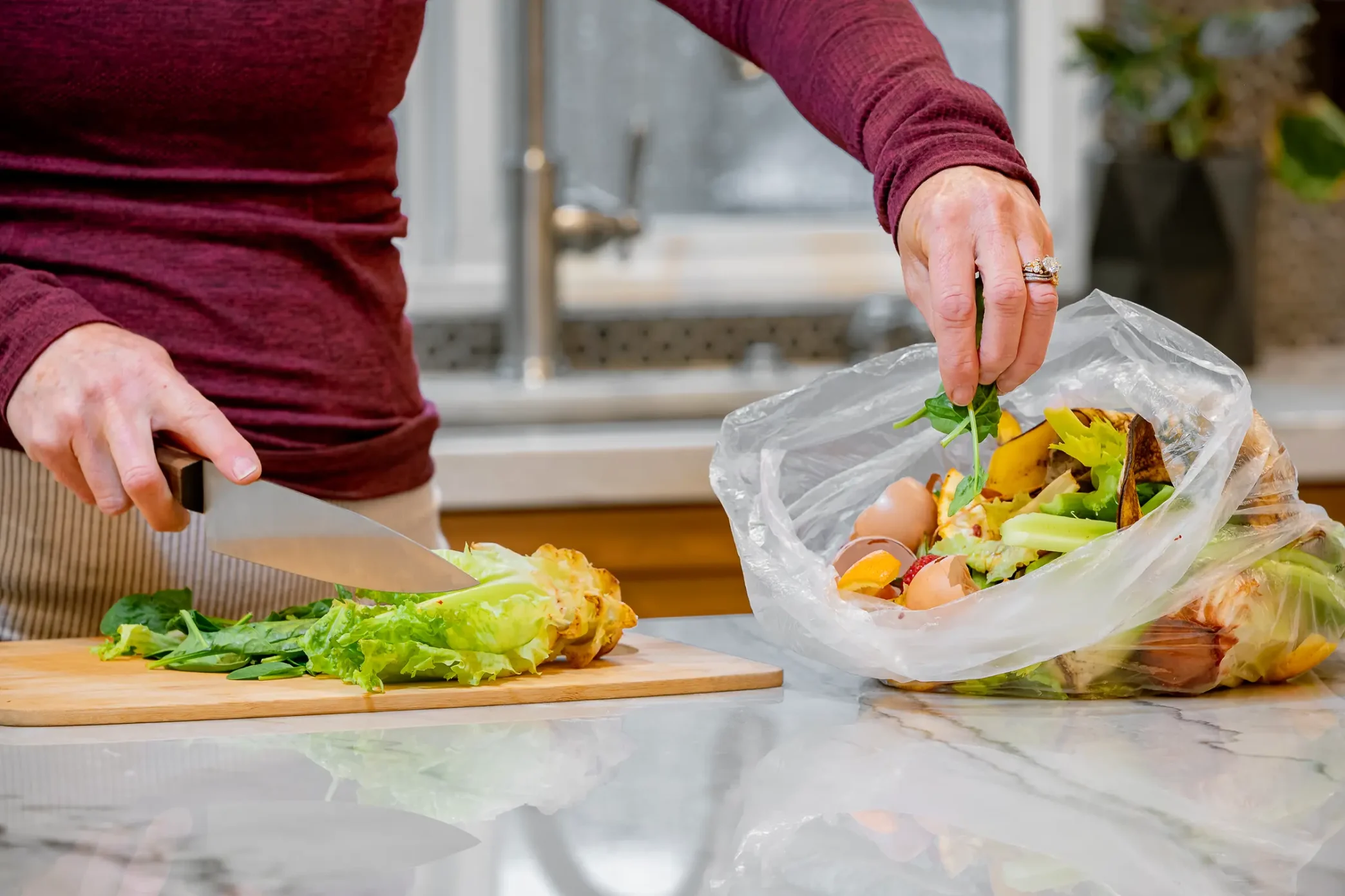
Collect Your Food Waste
- Keep a small bowl for food prep trimmings and for scraping your plate.
- Bag and tie off your food waste.
Step 2
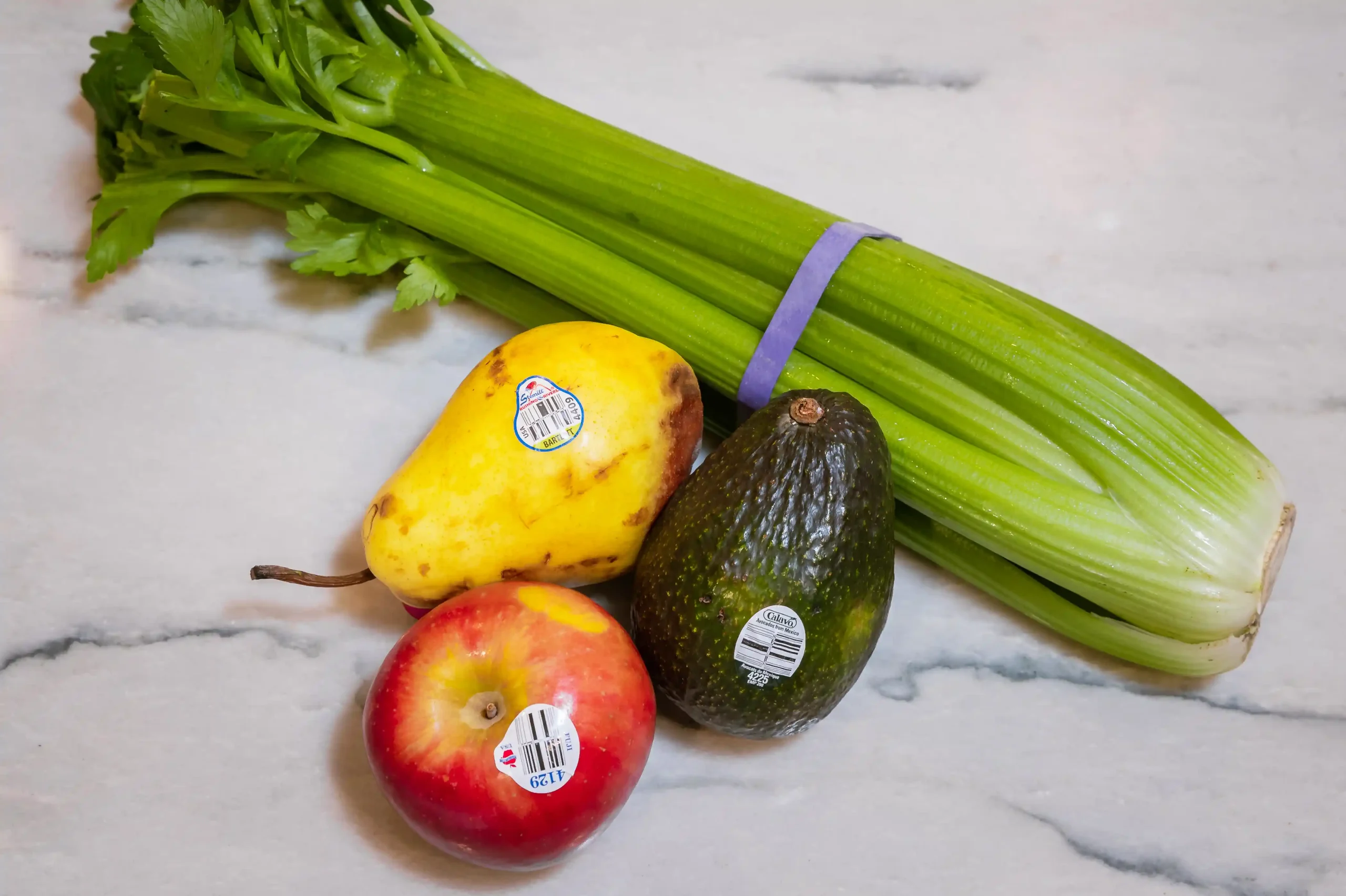
Clean Your Food Waste
- Remove stickers, twist ties, and rubber bands.
- No plastic, glass, or metal (except for the plastic bag containing the food waste.)
Step 3
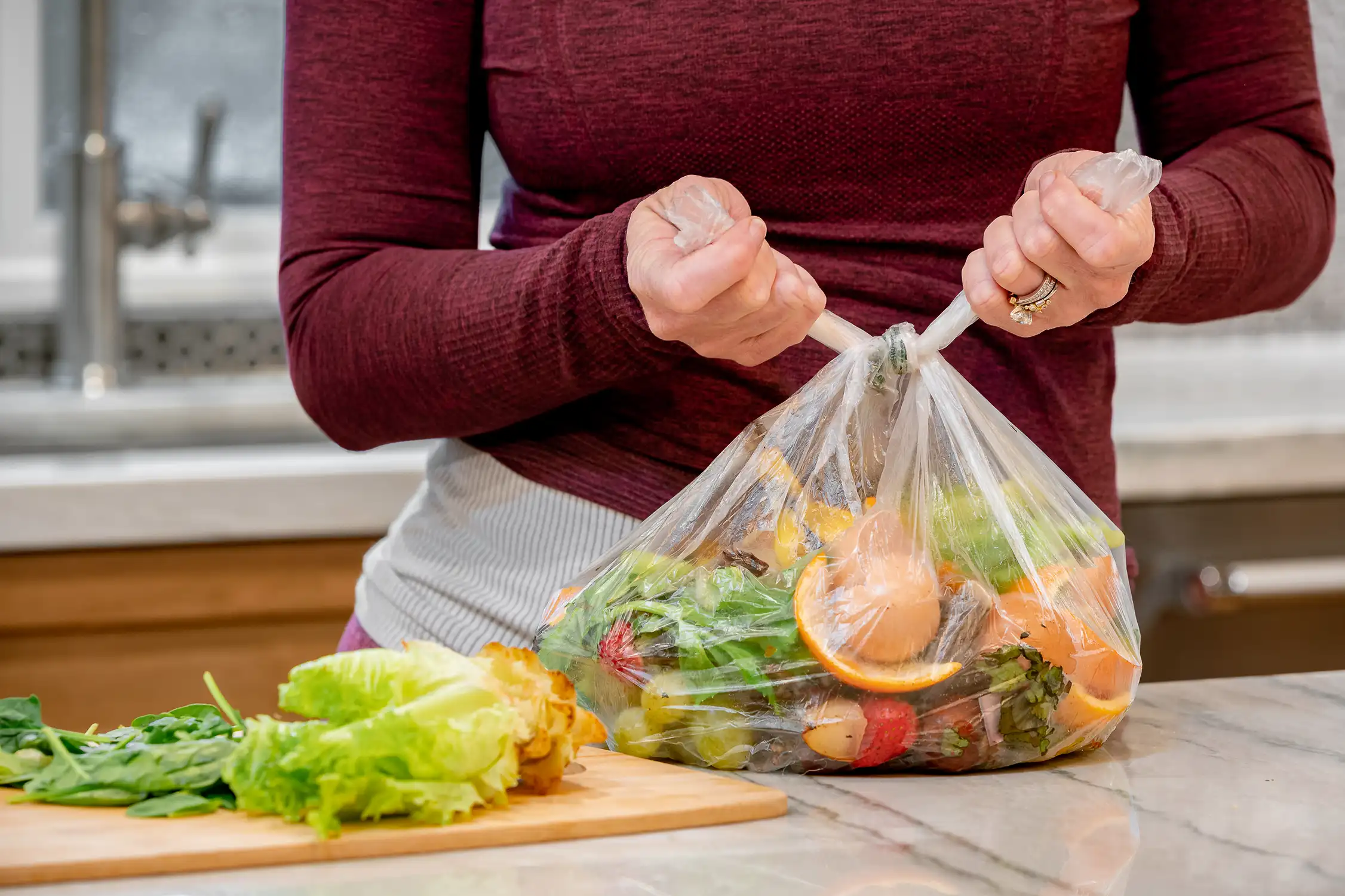
Store Your Food Waste
- On the counter
- Under the sink
- In the fridge or freezer, especially for meat and fish or during hot weather.
Step 4
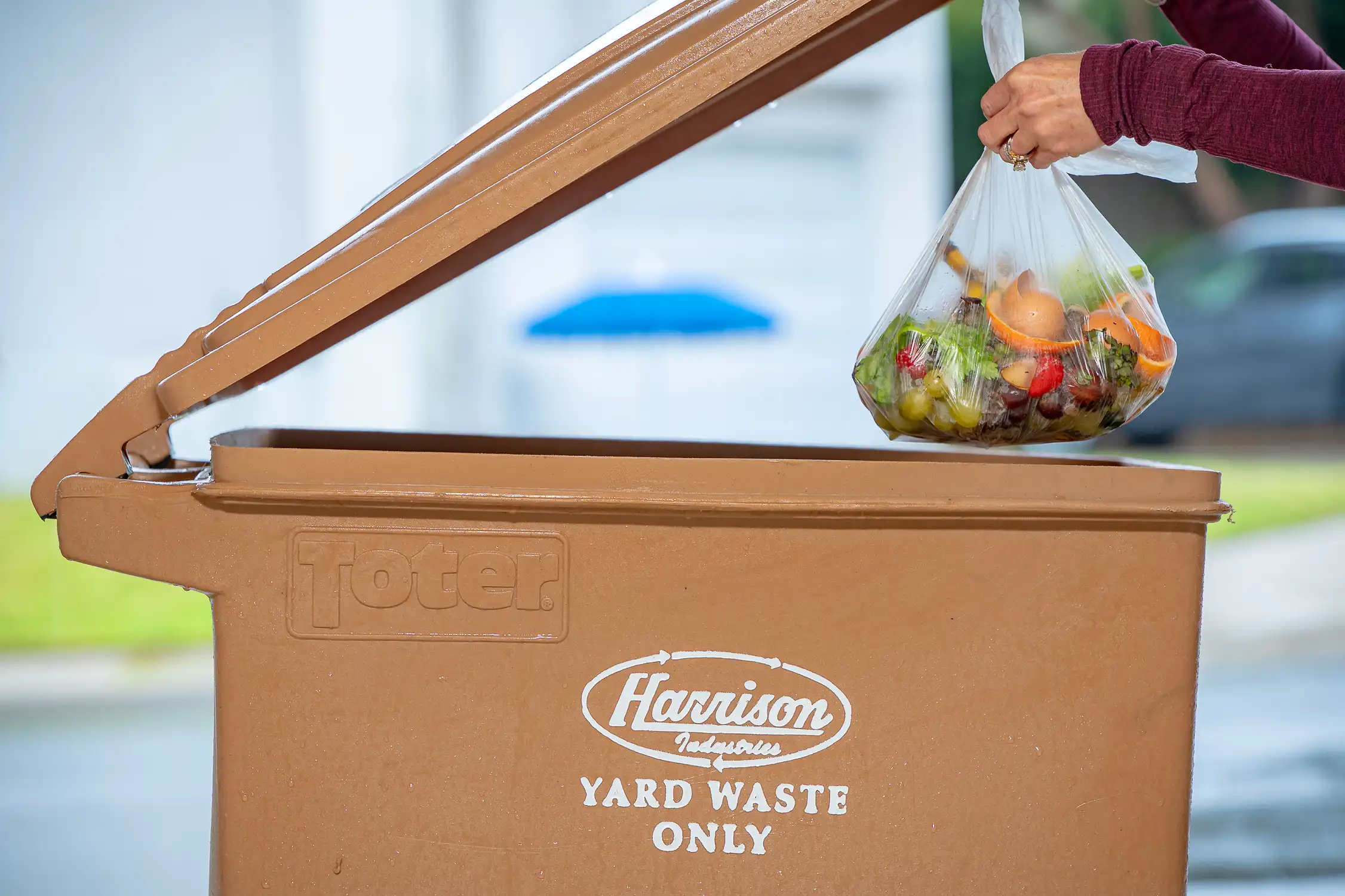
Dispose Your Food Waste
- Place your tied bag or bags of food waste in the yard waste cart each week for pickup.
What goes in the yard waste container?
Accepted Items
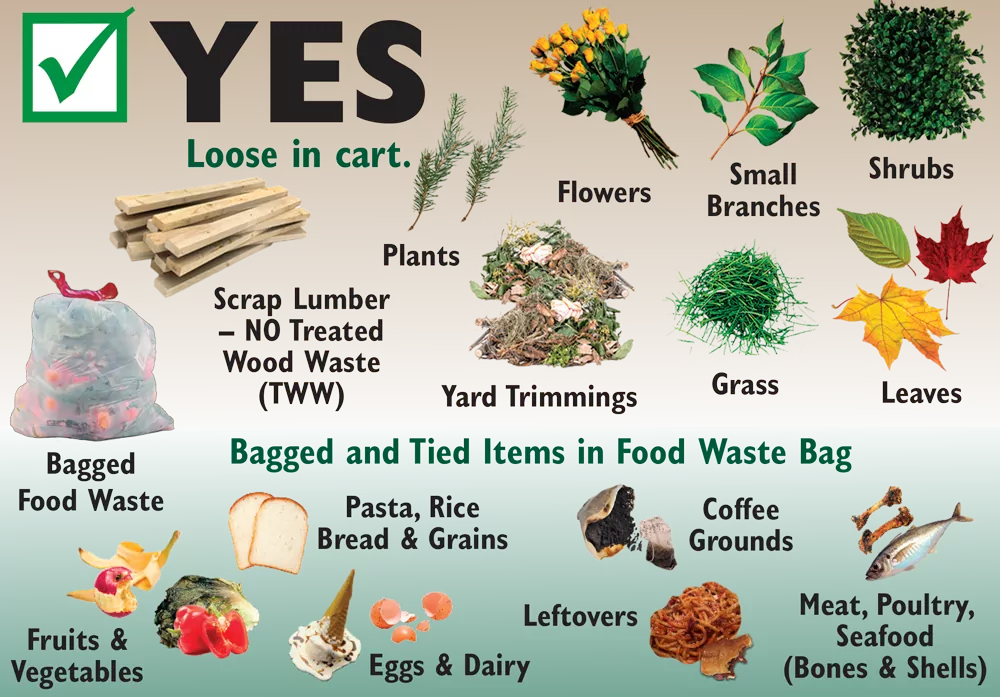
Not Accepted Items
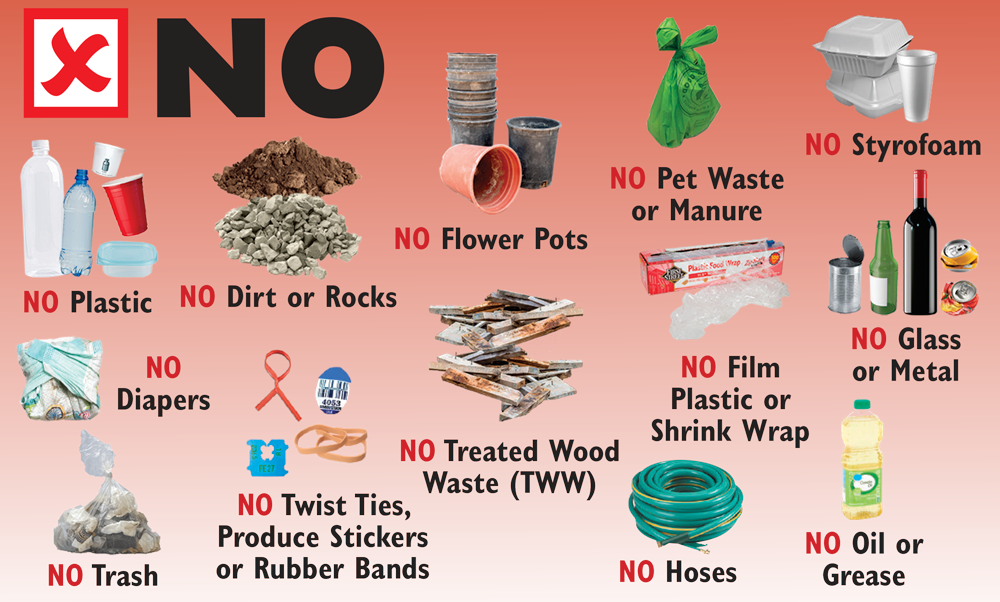
Residential Food Waste FAQ
What laws require food waste recycling?
California Senate Bill 1383 is a state law aimed at reducing (by 75% of 2014 levels) the amount of organic waste, including food waste, that’s sent to landfills and to recover 20% of edible food that would otherwise be sent to landfills. In effect since Jan. 1, 2022, SB 1383 requires all business operators, multi-family property managers and residents of single-family homes statewide to subscribe to organic waste collection services.
What is food waste?
Food waste includes meat, bones, poultry, seafood, shells, dairy, eggs, pasta, grains, coffee grounds, fruits, vegetables, and other inedible and edible parts of food.
What is organic waste?
When referring to SB 1383 requirements, organic waste includes yard waste, food waste, and plant fibers such as paper and cardboard. All of these materials are currently recycled across Ventura County in some capacity. Single-family homes have curbside yard waste collection service and existing state law (Assembly Bill 1826) requires large food-generating businesses including restaurants and hotels to recycle food and yard waste. Paper and cardboard are also recycled citywide in curbside and commercial recycling programs.
Note: The term “organic” has a different meaning in the recycling business than it does in farming, where an “organic” product is grown without chemically formulated fertilizers, growth stimulants, antibiotics or pesticides.
How do I separate my food waste?
You can collect your food waste in a small container (a pail with a lid or Tupperware) in your kitchen and store it on your countertop or under your sink. You can line your food waste container with a plastic or paper bag and, when it’s full, seal the bag securely and place it in your yard waste container. You can also store your food waste in a bag in your freezer, which can help avoid odors for certain foods that are not meant to be left at room temperature.
Note: Bagged food waste MUST be sealed securely before being placed into the yard waste container.
Can I place my food waste directly in my yard waste container without bagging it?
NO. All food waste must be bagged and sealed securely before being placed in the yard waste container. Food waste that is placed directly into the yard waste cart will contaminate the yard waste.
After collection, the bagged food waste will be separated at Gold Coast Recycling and Transfer Station and sent for processing at local facilities. Material sent to these facilities must be clean and free of other debris as it will be processed and turned into organic fertilizer or renewable energy. Due to the need for clean organic material, commingled organic material (yard waste and food waste together) will not be accepted at this time.
Isn’t the use of plastic bags counterproductive?
The decision to bag food waste was not made without considerable debate and was selected based on the relatively lower cost of service and reduced environmental footprint. While the use of bags seems counterintuitive, the alternative method of adding a fourth cart dedicated to food waste would require a fourth truck route and additional drivers. This would mean additional emissions from the extra trucks on the road and additional costs of service.
Ultimately, we’re looking to develop a program where food waste and yard waste can be commingled with soiled paper and other bio-based materials. Harrison is preparing to open a state-of-the-art facility known as the Limoneira facility (currently in the permitting stages) that will be able to accept commingled material. When the Limoneira organics processing facility is complete, we will be able to improve our program and eliminate the need for bagging food waste.
Do the bags have to be made of plastic?
Harrison Industries and its Mountainview processing facility in Oxnard both request the use of plastic bags to separate food waste, which need to be tied off and placed in the yard waste containers. We also accept paper bags, but they are less leakproof so not preferred. And, while we also accept bags labeled “compostable,” Mountainview does not have the ability to process them and so, like all empty food waste bags, they will be landfilled.
The best option is to reuse any plastic bags that you already have, such as plastic bread bags, food packaging bags or plastic grocery bags, to collect your food waste.
The use of plastic may seem counterintuitive, but this program complies with SB 1383, reducing the amount of organic material that is sent to the landfill, and reduces our methane emissions with the lowest impact on cost and space constraints for residents.
In the future, we would like to move toward a circular program without plastic, where food waste and green waste can be commingled with soiled paper and other bio-based materials. When the Limoneira organics processing facility is complete, we will be able to improve our program and eliminate the need for bagging food waste.
What happens to the bag of food waste after it's collected?
Once placed into the existing yard waste container, the bagged food waste material will be separated at Gold Coast Recycling and Transfer Station and sent for processing at the new Mountainview facility in Oxnard. Material sent to Mountainview must be clean and free of other debris as it will be processed and turned into organic fertilizer or renewable energy.
Can I add compostable materials, like compostable plates, cups, utensils and napkins, to my yard waste bin?
NO. Currently, our local processing facility, Mountainview in Oxnard, does not accept compostable foodware such as plates, cups, utensils and napkins. These items would contaminate the bagged food waste or loose yard waste material. They may be labeled “compostable,” but they should be disposed of in the landfill.
When the Limoneira organics processing facility is complete, we will be able to improve our program to include compostable foodware and other bio-based materials. We will publicize these changes as they happen.
Will separating food waste cause odor or pests?
Separating your food waste should not cause odor or attract pests any more than putting food scraps in your trash. The same materials are being collected, just in a different container.
